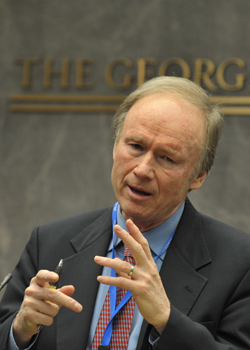On Thursday, September 13, Chicago-Kent hosted the 2012 Supreme Court Intellectual Property Review (SCIPR), a conference highlighting intellectual property cases from the U.S. Supreme Court’s 2011 Term and previewing significant IP cases in the upcoming 2012 Term. Two Chicago-Kent faculty members, Lori Andrews and Carolyn Shapiro, participated in panels at the conference. Visit the conference’s home page for the conference schedule, panelist biographies, and audio transcripts of the featured Supreme Court cases. See the posts “SCIPR Highlights, Part 2” and “SCIPR Highlights, Part 3” for more on the conference.
The following summary, prepared with the assistance of Lori Andrews, outlines the panel on Mayo Collaborative Services v. Prometheus Laboraties, Inc.
Lori Andrews joined panelists Arti Rai, the Honorable Paul S. Grewal, Jon Singer, and moderator Nabeela Rasheed in a panel analyzing the implications of the Sumpreme Court’s decision in Mayo v. Prometheus Laboratories.
The Court held that claims in two of Prometheus Laboratories’ patents, which covered a way of determining the optimal dosage for a certain drug, were invalid because they claimed a law of nature, rather than an invention. Prometheus’ patented approach consisted of instructing physicians to administer the drug to a patient, determine the patient’s bodily response to the drug (the resulting metabolite level), and recognize that a metabolite level outside a given range would be ineffective in treatment. The Court found that Prometheus’ patent claims were actually claims on a “law of nature”—the relationship between the concentration of metabolites in a patient’s blood and the drug’s effectiveness. In support of its holding, the Court cited over 150 years of Supreme Court precedent that stated “laws of nature” cannot be the subject of a patent.
The panel discussed the many questions raised by the case, including its most pressing: what constitutes a “law of nature,” and how are we equipped to judge one as such? Professor Lori Andrews offered clarification on this abstract point, differentiating between the legitimate patent of a drug—a synthetic human invention—and the illegitimate patent of a reaction to the drug—a law of nature. Andrews explained that merely discovering nature’s handiwork is not sufficient for a patent. Even though the U.S. Constitution protects “discoveries” in the patent clause, that term was used at the time to mean what we consider “inventions” today—something made by man.
Andrews and others also critiqued the actions of the Patent Office, calling to attention its poor job of applying the traditional standards of patentability to patents like Prometheus’ claimed methods. The panel also noted the lack of “safety valves” in the patent system—unlike in the copyright system—and suggested ideas that could possibly prevent this type of issue from reoccurring in patent law.
Professor Andrews has written and presented extensively on the subject of intellectual property and technology, especially health technology. She directs the Institute for Science, Law & Technology at Chicago-Kent. Read more of her work on SSRN, Bepress, and her website, the Social Network Constitution.
For more background on the Mayo v. Prometheus case, see Lyle Dennison’s opinion recap on SCOTUSblog.



Leave a Reply